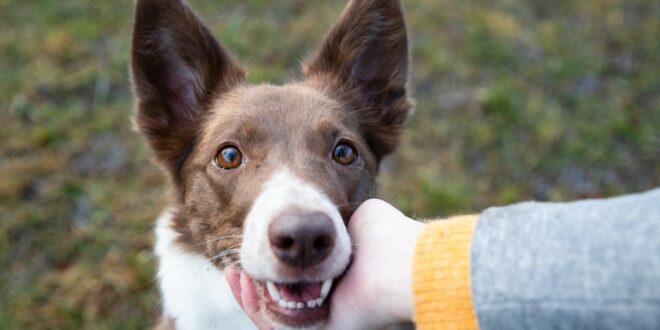How human is your dog’s name? The relationship between humans and their pets is a unique and special one. Pets, particularly dogs, often become like family members; their names reflect this bond.
However, have you noticed that more and more dogs are being given human names? What does it mean? What is the driving force behind this change in the norm?
It seems like the days of naming dogs Fido and Argos are over. As people are coming to terms with the idea that dogs, too, have characters and unique personalities, they are beginning to name their digs human monikers.
Later we’ll discuss naming our furry friends to reflect their human-like qualities, motivation, and much more.
How Human Is Your Dog’s Name?
The Washington Post has recently created a tool that allows pet owners to determine how “human” their dog’s name is.
The tool enables users to search for the most popular names for dogs that people commonly use. You simply type a name into the search bar; the result is immediately displayed.
For instance, if you search for “Rex,” the tool will provide information on how many people and dogs share that name.
It also provides a comparison by stating that in a hypothetical scenario where there are 100,000 people and 100,000 dogs in a stadium, 41 dogs and 1,146 people would be named Rex. The conclusion is that Rex is more commonly associated with humans than dogs.
Common Human Dog Names
If you want inspiration for naming your dog a human name, check out our top 10 picks of common human dog names.
- Emma
- Hunter
- Zoey
- Cooper
- Sophia
- Milo
- Carli
- Hazel
- Oliver
- Charlie
The Motivation Behind Giving Dogs Human Names
There has been a growing trend of giving dogs human names in recent years. One motivation behind choosing human names for dogs is the desire for a stronger bond with their pet.
Giving your dog a human name gives you a sense of connection and companionship. Some pet parents believe that by treating their pets as equals, they can build a deeper relationship based on mutual respect and understanding.
The motivation stems from the belief that dogs are not just animals but sentient beings capable of forming meaningful connections with their human counterparts.
Giving a dog a human name can also be seen as a reflection of the owner’s identity.
Many owners choose names that hold personal meaning to them or reflect their interests, hobbies, or cultural background.
For example, a dog owner who is a fan of literature may choose to name their pet “Hemingway” or “Fitzgerald,” while someone with a passion for music may opt for names like “Mozart” or “Lennon.”
Selecting names that resonate with you personally will help you create a deeper connection with your pets and feel a greater sense of pride.
For some owners, it may simply be a matter of personal preference. They may find traditional dog names cliché or unoriginal and instead opt for names that they feel are more unique or meaningful.
The Impact of Pop Culture on Dog Naming
There has also been a noticeable trend of dog owners choosing human names for their furry friends, often inspired by famous characters or celebrities.
This shift in naming patterns might result from people’s emotional connection with their favorite celebrities.
Owners feel a sense of closeness and familiarity with their pets by naming their dogs after the iconic figure. It allows them to admire a particular character and showcase their interests and passions.
Furthermore, the popularity of dog naming trends influenced by pop culture can reflect our desire to be part of a larger community or subculture.
By giving our dogs names associated with famous characters or celebrities, we feel connected to a shared experience or interest.
It becomes a way to join a community of like-minded individuals who share similar naming choices, creating a sense of belonging and identity.
The media also has a part in shaping our perceptions of dogs and influencing our naming choices.
Whether through movies, TV shows, or social media, we are constantly exposed to images and stories that depict dogs as loyal companions and family members.
This portrayal often humanizes dogs, making us view them as more than just pets. As a result, we are more inclined to give them names that reflect their perceived personality traits or qualities.
Common Celebrity Dog Name
- Ariana Grande
- Lady Gaga
- Hugh Jackman
- Madonna
- Taylor Swift
- Keanu Reeves
- Saoirse Ronan
- Will Smith
- Humphrey Bogart
- Meryl Streep
Gendered Human Names For Dogs
The selection of gendered human names for dogs reflects societal norms and expectations. In many cultures, traditional gender roles and stereotypes persist, even in the naming of pets.
Male dogs are often given more masculine-sounding names, while female dogs are given more feminine-sounding names.
This suggests that gender identity and expectations extend beyond humans and into the animal kingdom.
Common Female Human Names for Dogs
- Sadie
- Layla
- Katie
- Gracie
- Violet
- Stella
- Emilia
- Josephine (Jo)
- Harper
- Sasha
Common Male Human Names for Dogs
- Luka
- Maverick
- Jace
- Ricky
- Watson
- Easton
- Berkely
- Hudson
- Tony
- Austyn
As a result, we should consider the potential consequences of assigning gendered human names to dogs. The practice may reinforce harmful gender stereotypes and expectations, perpetuating the idea that certain behaviors or characteristics are inherently male or female.
However, a shift is taking shape- gender-neutral names, which promote inclusivity and contribute to a more egalitarian and open-minded perspective.
Gender-neutral names eliminate the constraints of traditional gender binaries and allow dogs to be recognized for their individuality rather than adhering to societal norms.
Common Gender Neural Human Dog Name
- Riley
- Avery
- Jordan
- Casey
- Morgan
- Cameron
- Taylor
- Quinn
- Charlie
- Alex
Owner-Dog Bonding Through Human Names
Many pet owners believe that bestowing their furry companions with a name traditionally associated with humans can enhance their bond. But how is this possible?
Using a human name for a dog positively impacts communication and interaction between the owner and the pet.
When a dog is given a human name, it creates a sense of familiarity and closeness. The owner may feel more inclined to treat the dog as a family member rather than just a pet.
The shift in perception can lead to a stronger emotional connection and a deeper understanding between both parties.
Furthermore, assigning a human name can also facilitate training and obedience. Dogs are highly responsive to their names, and when given a name resembling a human, they may be more likely to pay attention and respond to commands.
Dogs are social animals that thrive on human interaction, and hearing their name in a familiar context can reinforce their desire to please their owner.
In addition, giving a dog a human name can also foster a sense of companionship and companionship.
When an owner addresses their dog by a human name, it creates a sense of equality and partnership rather than a hierarchical relationship.
It can increase trust and cooperation between both parties, making the training and bonding experience more enjoyable for the owner and the dog.
Humanization Of Pets: The Downside
While giving a dog a human name may seem harmless, it can blur the lines between species and create unrealistic expectations.
When we treat dogs as humans, we may unintentionally project our emotions and motivations onto them, leading to confusion and misinterpretation of their actions.
Dogs have unique behaviors and traits that should be understood and appreciated, and naming them with human names may not align with their true nature.
Additionally, human names often carry societal connotations that may not resonate with a dog’s individuality.
Conclusion
How human is your dog’s name? The question of how human a dog’s name is can be quite subjective.
While some may argue that giving a dog a human name humanizes them and strengthens the bond between pet and owner, others may argue that it is simply a matter of personal preference.
What matters most is the love and care that an owner provides for their furry companion, regardless of the name they choose.
Whether it’s a traditional dog name or a human name, what truly matters is the relationship and connection that is formed.
 Being Human
Being Human




